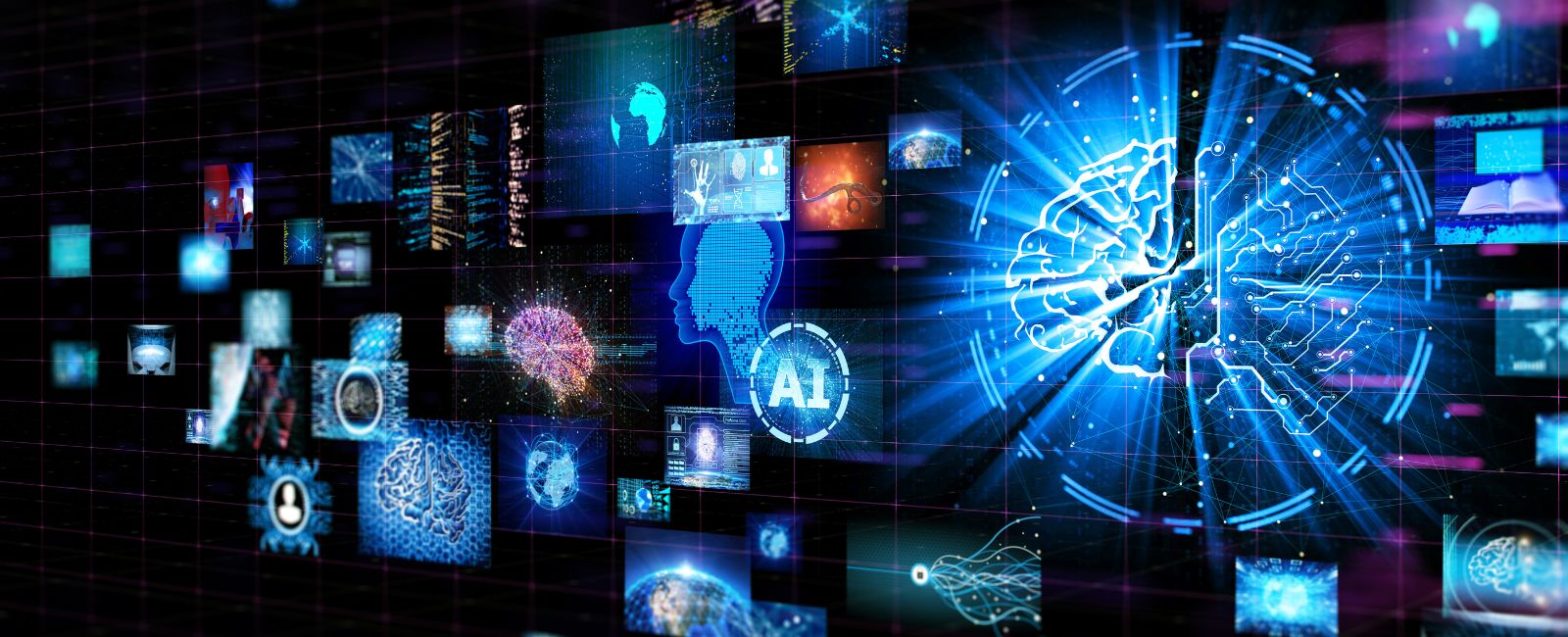Will AI steal pay cheques of Pakistan's freelancers?
We need to find a way to capitalise on Gen-AI tools while being conscious of its impact on people and this planet

Since the release of ChatGPT in November 2022, the world hasn’t been the same for technology companies and talent, especially freelancers. We are constantly seeing new Gen-AI tools being released, courses and programmes being popped up to teach these newer tools, a certain level of uncertainty due to the possible job displacement and scarcity of freelance work, and also, conversations around the impact of Gen-AI on human creativity, psychology, art, and the environment. It's a lot to take in, and honestly, most of it gets pretty confusing when you try to make sense of it.
So, let's unpack this, especially in the context of Pakistan and our freelancing ecosystem!
Pakistan is one of the top three global freelancing hubs, with nearly three million freelancers providing their services primarily to the Global North. In the 2025 fiscal year, our freelancers contributed approximately $400 million in foreign exchange earnings through remittances. The government has been interested in this space for a while now and has launched programmes like TechLift, NAVTTC, e-Rozgaar, and DigiSkills to train more people in tech skills. Freelancers also have a maximum of 1% flat tax on their gross incomes when earning in foreign currency and bringing this money via legal banking channels. So, we know that the opportunity is there, and the government has been taking it seriously, but truth be told, it is too little too late, because as we have started being part of the game, the rules have changed, especially because of the rise in Gen-AI tools. Freelancers in Pakistan are seeing a shift in the market as low-tech work is disappearing from the horizon, which was one of the biggest skill sets of Pakistani freelancers, including content generation, audio/video editing, graphic design, scheduling, virtual assistance, and data-entry-related work.
“As a freelance content strategist, I’ve seen clear changes since AI tools like ChatGPT entered the scene. Clients now expect polished content, delivered fast. Entry-level work, like basic blogs and product descriptions, is being handed to AI. It’s cutting into income for many freelancers, especially beginners,” shared Rimsha Salam, a freelance content strategist and writer.
But Salam also sees an opportunity in it. “I think we are at a point where writers need to reassess their value. The market doesn’t need more writers who just churn out content. It needs strategists and editors who can use AI wisely to change the content game,” she said, adding that the future of content isn’t about resisting AI, but “using it proactively to create meaningful human-centric content”.
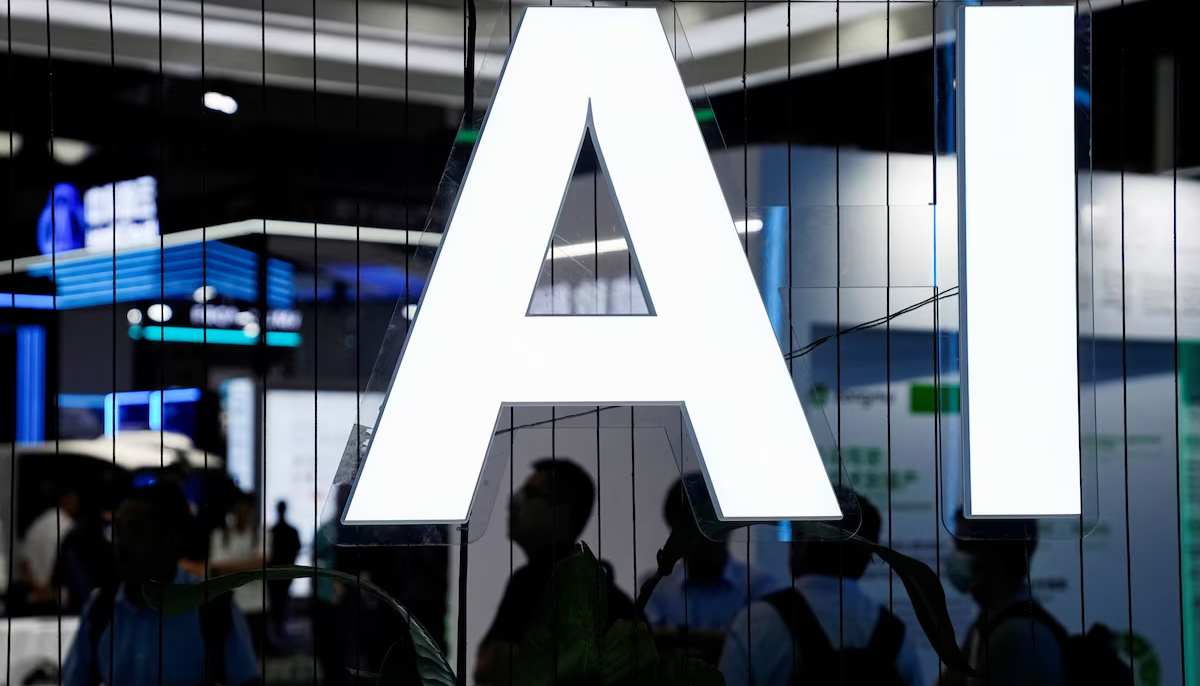
Ramla Kaleem Khan, a freelance product designer and a UX strategist, said that these new AI tools were doing much more than before.
“They help with brainstorming, idea generation, and even parts of execution. That means clients no longer need to hire multiple specialists. As a product designer, I initially focused on product design and Figma projects. But once I started using these AI tools myself, it became obvious how powerful and fast they are,” said the tech professional.
Khan continued that competing with AI tools doesn't make sense. “Sure, they’re not perfect and you can’t do everything in one click, but if you know how to use them well, you can accomplish far more in much less time.”
These are just two stories from the dozens I have collected while researching the impact of Gen-AI on Pakistani freelancers and their sentiments towards this new reality. Entry-level work is harder to find, low-tech work is not available for humans anymore, and if you don’t know the newer tools, you will find it almost impossible to find projects. So, from the anecdotal data that I have from my community spaces, and organisations, we are seeing a reverse migration, people who left their full-time jobs to opt for freelancing are now back in the market looking for part-time or full-time work, as the changes in the industry and client requirement have made it difficult for them to make ends meet. Gig work is already unpredictable and requires a significant time investment upfront, and with the recent shift in the industry, finding a consistent flow of work contracts has become even more difficult.
One of our community members, who requested to stay anonymous, shared, “I became a freelance graphic designer in 2017 after getting married, as I thought this new path would better suit the current stage of my life. I started with local clients, but due to the market immaturity and the lack of work ethic, I moved to freelancing platforms and found work on Fiverr. I had a good run till early 2024, but since then, I have hardly gotten any projects.”
She spoke about moving towards Upwork, but the platform has become almost impossible for a new freelancer to break into. “It is highly competitive and really expensive. Client expectations have also shifted. They are now looking for multiple skill sets in a single person. They want a graphic designer, content strategist, digital marketer, video editor, and UX designer, all rolled into one hire. Clients also don’t understand the limitations of AI and expect it to work flawlessly and without human effort. I believe, in some cases, AI is making us work more and make less money,” said the community member.
But is this displacement only happening for content writers and graphic designers? Not really. Bloomberg found that AI could replace more than 50% of the tasks performed by market research analysts (53%) and sales representatives (67%), compared to just 9% and 21% for their managerial counterparts. This displacement is a global phenomenon, as we are seeing hiring freezes and layoffs, not only due to the economic downturn, but also due to the newer tools making many humans replaceable. In 2025 alone, according to job portal Final Round AI, nearly 78,000 tech jobs have been eliminated due to AI automation, with companies like Microsoft, IBM, Meta, and Amazon conducting large-scale layoffs, partially attributed to AI replacing human tasks. For example, Microsoft cut 6,000 jobs and IBM laid off 8,000 employees in AI-affected roles. For freelancers, AI automation is putting virtual assistants, project coordinators, bookkeepers, subtitlers, and billing specialists out of work. The next leap in this race has already been taken by OpenAI with the launch of Agentic AI on July 17th, 2025, which can autonomously take initiative, pursue goals, and perform tasks without constant human prompting.
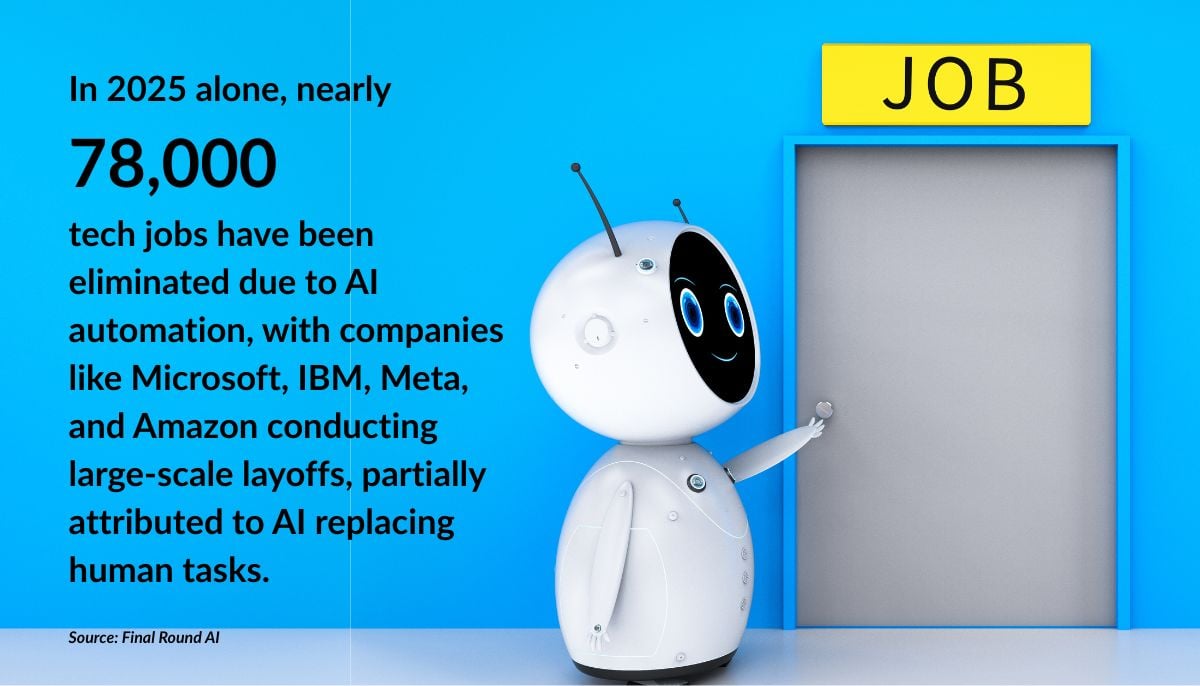
Pakistan is profoundly affected by this shift as we are a service-providing nation, with a majority of youth who are interested in technology and want to make money for a better future. It has also impacted women more, as many can’t pursue full-time employment or traditional corporate roles due to care work, safety issues, and are making money by working on short-term projects from their homes.
Workers aren’t just dealing with platforms. They are increasingly working through AI agents that assign tasks, handle payments, and manage communication. This shift brings both promise and peril. While AI can boost flexibility and unlock new economic opportunities, it also risks widening income inequality, increasing job insecurity, and accelerating a global race to the bottom, as Forbes highlighted.
But the story is not all gloom and doom, because Gen-AI is bringing in new frontiers to explore and benefit from, especially when it comes to developing new offerings. It is also expected to improve workflow and increase productivity. Established professionals are employing AI tools to improve their outputs and seem to be excited about its prospects. I spoke to a few of them in detail to learn how they were using Gen-AI in their day-to-day lives.
Quratulain Tariq, a salesforce expert with nearly a decade of industry experience, spoke about observing a “major shift” in how we approach technology over the past few years.
“The focus has moved from simply automating tasks to building intelligent systems that can take on more complex decision-making. Clients are embracing this shift, too. There is a growing demand for faster delivery, AI-first strategies, and smarter, more cost-effective solutions. In one project, I implemented AI for data extraction and classification, which reduced manual effort by 40 to 45%. That kind of result is driving real excitement around what is possible,” she said.
Tariq said she thinks freelance work has become more competitive, especially in traditional roles like salesforce consulting, but she looks at it as a “signal to adapt”.
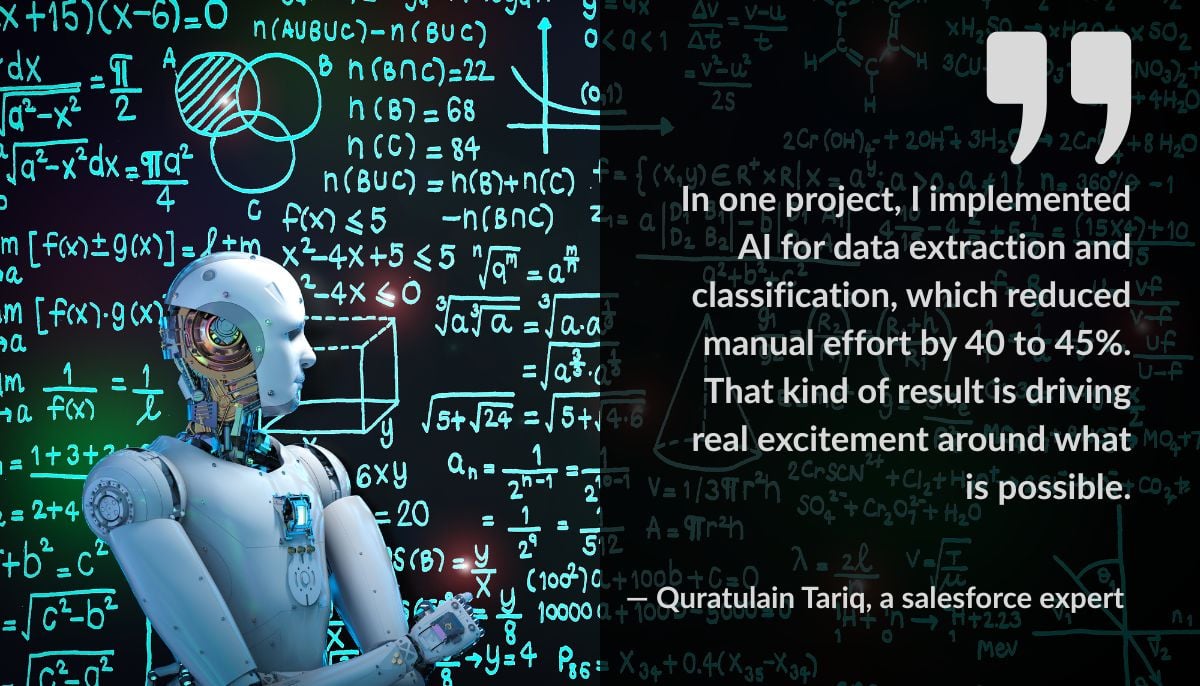
“I am actively learning and integrating AI into everything I do. Not just to keep up, but to get ahead. The learning curve is steep, but it is also an incredible opportunity to grow, deliver more value, and build a future-ready career,” she added.
Kashif Aziz, a senior engineer and veteran freelancer, maintained the change in expectations of clients owing to the arrival of AI technology and tools.
“I've been using AI-powered tools for a couple of years now, and the biggest shift is how quickly I can prototype and test ideas. Expectations have changed, too. Clients now assume faster turnarounds at lower cost, which pressures those doing undifferentiated coding. But demand remains strong for those who can design systems, solve complex problems, or guide strategically.”
According to Aziz, tools like GitHub Copilot, ChatGPT, Claude, Cursor, and Loveable help her prototype faster, refactor smarter, expand test coverage, and explore new tech. “They've made me more versatile and client-ready across the board. The key is to use AI, not compete with it. AI hasn’t taken income away from me, but it has changed how I earn it.”
Komal Alam Khan, a technical project manager who is also a graduate from Pakistan’s first women-only freelance accelerator, run by CaterpillHERs, admitted to seeing a shift toward more tech-enabled collaboration as a project manager.
“While basic manual work has slowed down, embracing automation and AI has allowed me to increase my value, manage projects efficiently, and win better-paying contracts. The magic is to evolve with technology; AI isn't replacing me, it is my copilot, agent, and assistant. In fact, in recent interviews, I was asked who I follow in AI, which shows that staying informed is now part of the job.”
The pace of product design has accelerated, and efficiency and scalability are no longer luxuries; they’re survival tools, said Shane Hussain Naqvi, a senior product designer.
“AI isn’t replacing designers outright, but it’s changing how we work. Tools like Figma Make and AI plugins within Figma, as well as external platforms like Lovable, Vercel’s V0, Cursor, and MCP for Figma, are transforming workflows. What used to take weeks can now be done in hours. As a result, client expectations have changed.”
Naqvi stated that clients now expect faster turnarounds and higher fidelity right from the start. “That can feel like pressure, but it’s also an opportunity. With the right skills and the willingness to stay on top of new tools, you can dramatically increase your output and your income.”
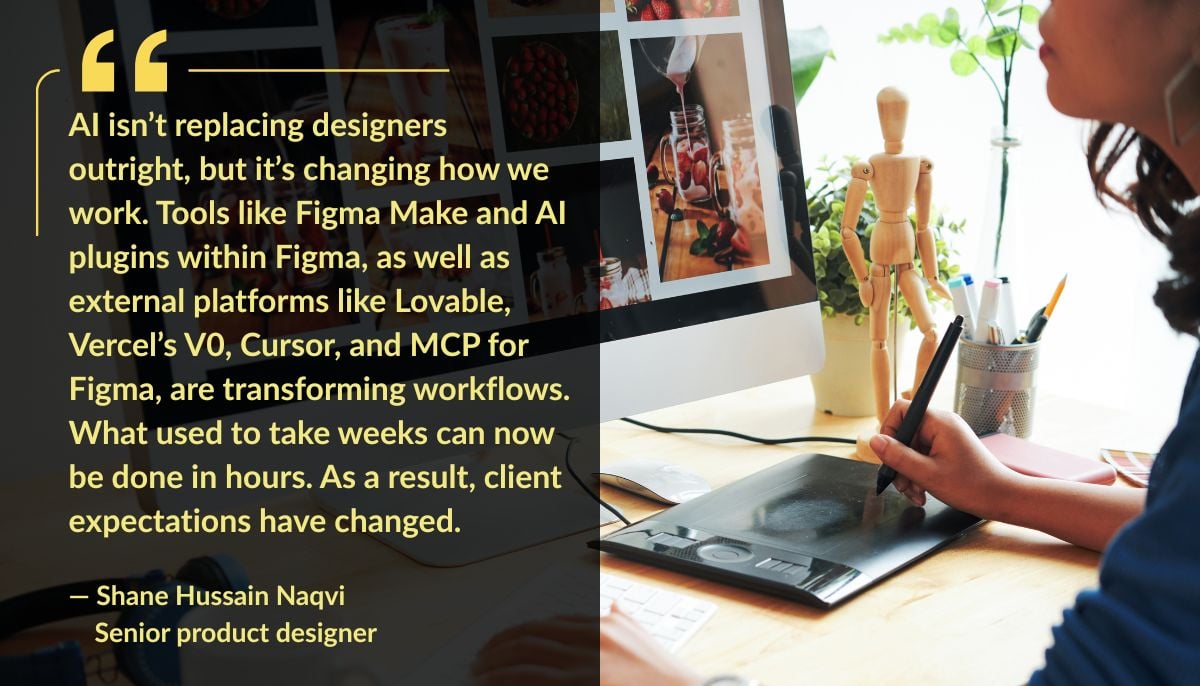
For these professionals, AI is automating routine tasks, enhancing their productivity, augmenting their capabilities, optimising workflows, and improving their decision-making. But is AI always correct and can replace human creativity, empathy, and decision-making? The answer is no. AI is only a tool and is amoral, but we tend to humanise it. We can’t rely on it to replace human creativity, intelligence, and empathy. These Gen-AI tools are only bound by the guardrails set by their creators, and most of them scrape data from the World Wide Web and learn patterns from a biased and ever-evolving dataset. These tools are also not always accurate; ChatGPT and Gemini are reported to give incorrect answers and hallucinate more often than we would like to admit. Accuracy rates for ChatGPT hover around 88.7% in general benchmarks, which means errors occur about one in eight responses on average. So, we are also overestimating the capabilities and accuracy of these tools by blindly relying on them.
There is a huge environmental impact of Gen-AI tools in the form of water and power consumption, as well as the mining of metals to create hardware for training and running these tools, which also contributes to greenhouse gas emissions. Another big issue is with the use of copyrighted materials for AI training, which is equivalent to stealing work from authors, artists, researchers, and other creatives.
So, how do we, as a country and as individuals whose livelihoods depend on outsourced work, navigate this complex and uncertain transition?
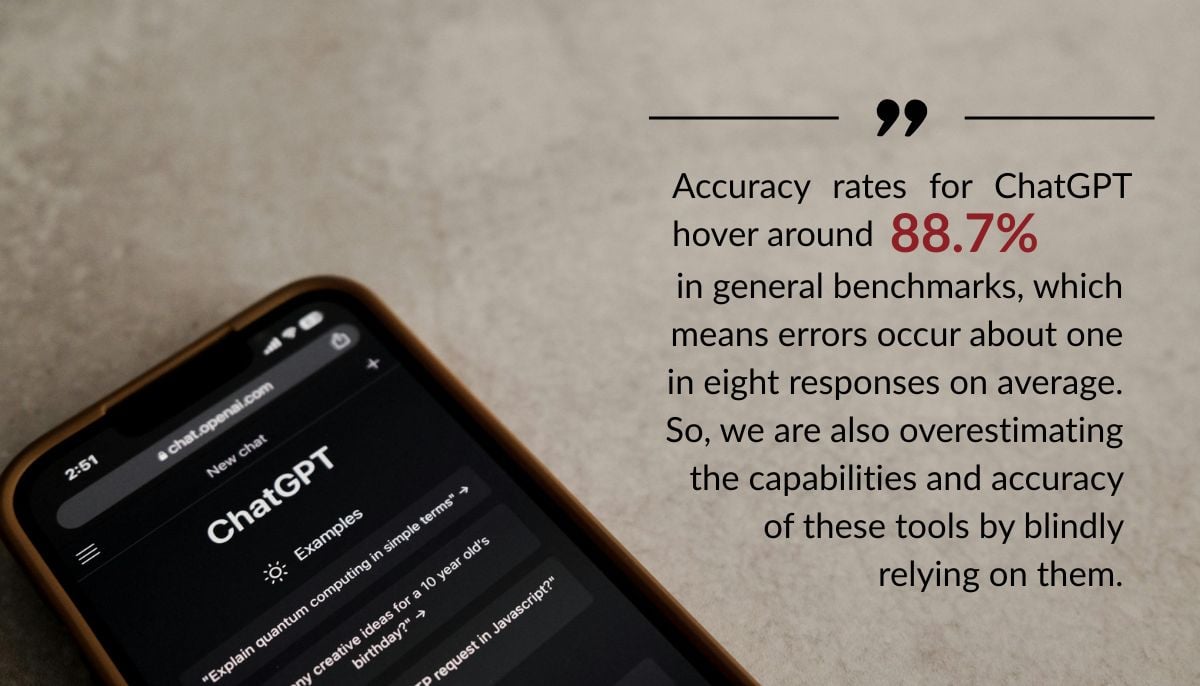
We need to shift from low-tech, outsourced work to cutting-edge and emerging tech development, creating products and tools not just for our local market but for the world. This transformation will require coordinated effort from policymakers, academics, public and private training organisations, software development companies, and, most importantly, from freelancers who must rapidly upskill. We also need to work on our global image as not just a country with low-tech, cheap labour, but a country with highly skilled technology talent capable of developing cutting-edge solutions. Developing Gen-AI tools locally, while integrating local languages, ethical frameworks, and cultural and legal contexts, can enhance their adoption in our economy and provide businesses with a competitive edge without incurring the high costs associated with international platforms. We need to act fast if we want to find our footing in the global tech landscape, even amid the current disruption.
Gen-AI tools are not going anywhere, and they are improving at an exponential rate. We need to find a way to capitalise on this opportunity while being conscious of its impact on people and this planet. These tools have displaced income for many, but they’re also enabling the creation of highly efficient systems, opening up new types of roles and opportunities. To get ahead of the curve, we need to cultivate self-learning, problem-solving, creative thinking, and fearless experimentation, because the future belongs to the bold.
Faiza Yousuf is a software engineer with over 15 years of experience building tech products and teams. She spearheads some of Pakistan's most prominent initiatives to enhance women's inclusion in technology and the economy. Her initiatives, namely WomenInTechPK, CodeGirls, and CaterpillHERs, have impacted over 15,000 women and girls nationwide. She posts on X @FaizaYousuf
Header and thumbnail image by Canva



